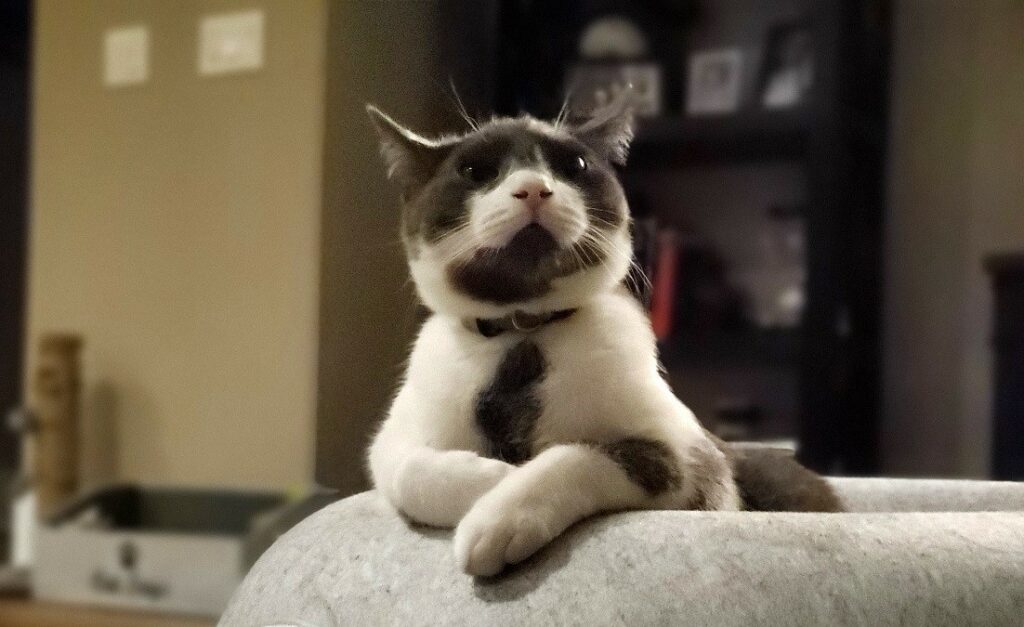Peppermint might be your go-to for fresh breath, holiday candles, or stress relief, but for cats, it is a different story. While the scent may seem harmless or even refreshing to us, peppermint can actually pose a serious health risk to cats.
Before you reach for that essential oil diffuser, offer your curious feline a whiff of your herbal tea, or hang candy canes on your Christmas tree, it’s worth understanding how peppermint affects their system and why it should be used with extreme caution.
Peppermint and Cats Just Don’t Mix
At the heart of peppermint’s appeal is menthol, the compound responsible for its cooling sensation and strong smell. While humans may enjoy this zingy sensation, cats process substances like menthol very differently, and their bodies are not equipped to handle many of the compounds found in essential oils and herbal products.
The most common way cats come into contact with peppermint is through:
- Essential oil diffusers
- Scented candles
- Air fresheners
- Herbal teas left unattended
- Topical products applied by humans
Even small amounts of peppermint oil can irritate a cat’s respiratory system or cause more serious issues if ingested or absorbed through the skin.
Why Peppermint Oil Is Especially Dangerous
Essential oils are highly concentrated. A single drop of peppermint oil contains the potency of many leaves, making it much more intense than anything found in natural plants. Cats lack the liver enzymes needed to break down certain compounds in essential oils, including those in peppermint.
This means that what is soothing to you can be toxic to them.
Common symptoms of peppermint oil toxicity in cats include:
- Drooling or foaming at the mouth
- Vomiting
- Difficulty breathing
- Lethargy
- Tremors or muscle weakness
- Pawing at the mouth or face
If you suspect your cat has been exposed, it is best to contact your vet or a pet poison helpline immediately.
Diffusing Oils Around Cats Can Still Be Harmful
You might think, “I am not putting the oil directly on my cat, so it’s fine.” Not exactly. Diffused oils release microscopic particles into the air, and cats, with their keen noses and small bodies, can easily inhale or absorb those particles. Their respiratory systems are far more sensitive than ours, and even indirect exposure can lead to problems over time.
Cats who spend time in rooms with active diffusers may develop signs of respiratory distress, especially if the room is poorly ventilated.
Peppermint in Its Natural Form Is Not Safe Either
Fresh peppermint leaves may seem like a gentler alternative, but they are not safe snacks either. While less concentrated than oil, peppermint leaves still contain compounds that can irritate a cat’s digestive tract or cause vomiting if eaten.
Cats are often drawn to strong scents out of curiosity, not because they understand what is safe. A minty plant on your windowsill might end up as a nibbled mess and a trip to the vet.
Why Some Cats Might Be Attracted to It
Here is the twist. Peppermint belongs to the same family as catnip: the mint family. So, some cats may be attracted to peppermint simply because it shares chemical similarities with their favorite herb. But don’t be fooled. While they might act excited or sniff around, peppermint does not offer the fun, harmless high of catnip. It can still be very toxic, especially in concentrated forms.
This behavior can be confusing for cat parents, who may mistake interest for enjoyment. Curiosity, in this case, can absolutely hurt the cat.
What to Use Instead
If you are looking to freshen your home or provide your cat with enrichment, there are far safer alternatives to peppermint.
Try these instead:
- Use an air purifier with a HEPA filter to clean your air without adding scent
- Try baking soda for natural deodorizing
- Offer real catnip or silvervine toys for enrichment
- Use vet-approved calming diffusers made specifically for cats, like pheromone sprays
Always check with your vet before using any product that releases fragrance or contains essential oils.

Well, why did you leave it out if you didn’t want me to eat it?? #SillyHumans #FuzzyGarbageDisposal
Joey
How to Protect Your Cat from Accidental Exposure
Cats are known for finding the one thing you hoped they would ignore. To keep your feline safe:
- Store essential oils and peppermint products in closed cabinets
- Do not use diffusers in rooms your cat has access to
- Avoid applying peppermint oil to your own skin if you plan to cuddle your cat
- Keep an eye on natural herbal teas and toothpaste with mint flavoring
Prevention is always easier (and cheaper) than treating a poisoning emergency.
Final Thoughts: Minty Fresh Is Not Cat Friendly
You may love the clean scent of peppermint, but your cat’s safety always comes first. Peppermint, especially in oil form, is not safe for cats. Whether they inhale it, ingest it, or get it on their skin, the results can range from irritation to full-blown toxicity.
Stick to safe alternatives for scent and enrichment, and keep the peppermint strictly in the human zone. Your cat will thank you for skipping the mint and sticking to things that actually make them purr.
Recent Posts
Your Cat Might Be a Furry Little Healer… or at Least a Fuzzy Alarm System If you’ve ever had your cat suddenly become extra clingy when you’re under the weather, you’re not alone. From...
Cats are experts at hiding things, socks under furniture, their disdain for your playlist, and, unfortunately, symptoms of illness. In the wild, showing weakness could make them a target, so even...


